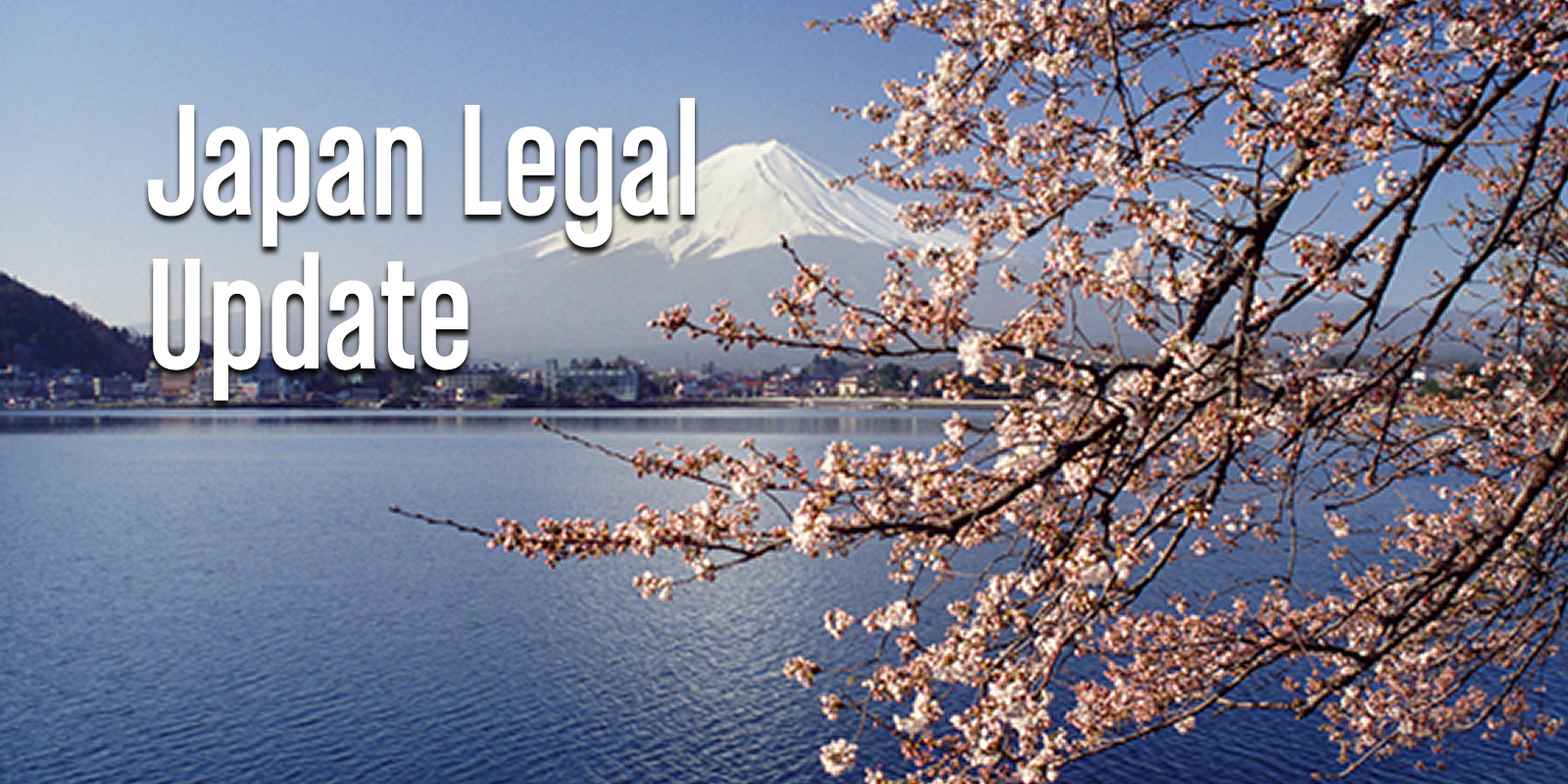
Japan Legal Update | Vol. 35
Intellectual Property
Cabinet Approves and Submits to the Diet the Bill to Partially Amend the Unfair Competition Prevention Act
On February 27, 2018, the Japanese Cabinet approved and submitted to the Diet the Bill for the Act of Partial Revision of the Unfair Competition Prevention Act, Etc. ("UCPA Amendment Bill").
The UCPA Amendment Bill aims to create an environment that will further facilitate the use of data, given the ongoing development of information technology. While the bill's main amendments are to the Unfair Competition Prevention Act ("UCPA"), the bill also includes amendments to the Industrial Standardization Act, the Patent Act, and the Patent Attorney Act. One of the key aspects of the bill is the addition of new acts of unfair competition: the wrongful acquisition, use, and disclosure of technical or business information that is managed using an ID/password or with encryption.
Currently, under the UCPA, the wrongful acquisition, use, and disclosure of trade secrets constitute acts of unfair competition and are subject to the remedies set out in the act.
Under the UCPA Amendment Bill, such remedies, including injunctive relief and the presumption of damages, will also apply to the wrongful acquisition, use, and disclosure of technical or business information not qualifying as trade secrets under the UCPA as long as the statutory requirements regarding information management are met.
If enacted, the UCPA Amendment Bill (excluding certain provisions) will come into force within one-and-a-half years from its promulgation. The enactment of the UCPA Amendment Bill is expected to have a significant impact on corporate information management practices.
Intellectual Property
Bill to Partially Amend the Copyright Act Approved by the Cabinet and Submitted to the Diet
On February 23, 2018, the Cabinet approved and submitted to the Diet a bill to partially amend the Copyright Act ("Copyright Act Amendment Bill"). With the continued advance of information and communication technologies, the Copyright Act Amendment Bill is intended to expand the scope of free use of copyrighted works without the copyright owner's permission. Unlike the concept of fair use in the United States, Japan's Copyright Act sets out an exclusive list of situations in which third parties may freely use copyrighted works without obtaining the copyright owner's permission. The Copyright Act Amendment Bill will expand the scope of such situations.
Of particular note are the following provisions included in the Copyright Act Amendment Bill, which are intended to promote industries in the information technology sector.
- A provision allowing copyrighted works to be used without permission, where such use is in relation to big data services, etc., that will not adversely affect the market for the copyrighted works. This would apply in cases where the expression of the copyrighted work is not perceived by the user, even though the work is copied onto a computer, such as a book search service where the search result displays only a portion of the book.
- A provision that would permit certain defined uses of copyrighted works without permission, since the advance of information technology may bring new ways to promote the utilization of copyrighted works in the future. The provision is intended to promote innovation by adopting a concept similar to "fair use," allowing for the flexible recognition of future uses of copyrighted works without requiring further revisions to the law.
The Copyright Act Amendment Bill (excluding certain provisions) is scheduled to come into force on January 1, 2019. The enactment of the Copyright Act Amendment Bill is expected to accelerate advanced technological development in fields such as artificial intelligence and the Internet of Things.
Corporate
Cabinet Approves and Submits to the Diet the Bill to Partially Amend the Consumer Contract Act
On March 2, 2018, the Cabinet approved and submitted to the Diet the Bill to Partially Amend the Consumer Contract Act ("CCA Amendment Bill").
The CCA Amendment Bill adds, among others, "solicitation by wrongfully exploiting social inexperience to create unease" to the list of acts of wrongful solicitation that constitute grounds for terminating a contract. The CCA Amendment Bill would also allow for the termination of a contract where a business makes a grossly negligent misrepresentation; currently, the Consumer Contract Act recognizes only willful misrepresentations. In addition, the CCA Amendment Bill includes as invalid contractual provisions having no effect: (i) provisions allowing businesses to terminate contracts if a consumer has a legal guardian; and (ii) provisions granting businesses the right to determine their own contractual liabilities. Furthermore, the CCA Amendment Bill obligates businesses to make an effort in information sharing and drafting of contractual provisions.
The CCA Amendment Bill is scheduled to come into force within one year from its promulgation and will not apply to consumer contracts entered into during that time. Since it is currently not uncommon for businesses to use the newly added wrongful contractual provisions, upon the enactment of the CCA Amendment Bill, businesses should, going forward, review their contractual provisions in light of the amendment and should ensure that their methods of solicitation are compliant.
Litigation
Enforcement Date of the Amendment to the Code of Criminal Procedure Announced
On March 22, 2018, the Cabinet Order to Specify an Enforcement Date of the Amendment to the Code of Criminal Procedure, Etc. was promulgated. The amendment will introduce a plea-bargaining system and will come into force on June 1, 2018. An additional Cabinet Order, promulgated on the same date, provides that the criminal violations of 48 laws, including tax laws, as well as the crimes of special bribery and aggravated breach of trust, are subject to plea bargaining. For details of the amendment, please see the June 2016 issue of this newsletter.



